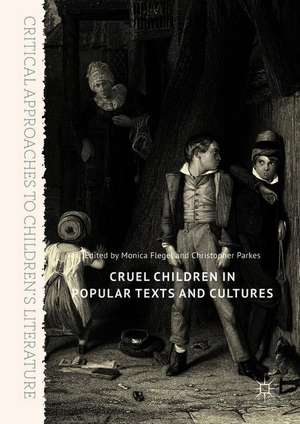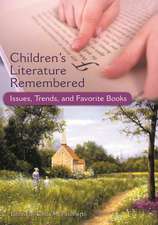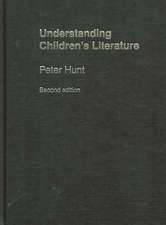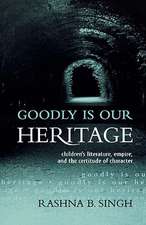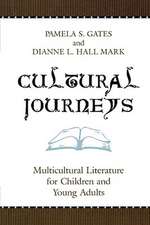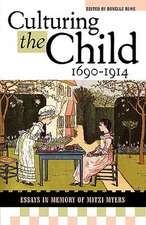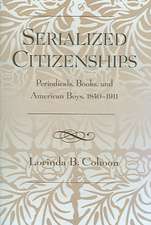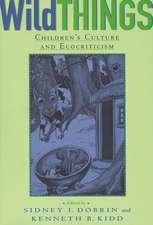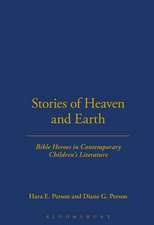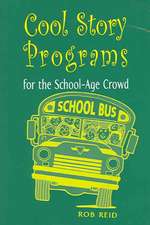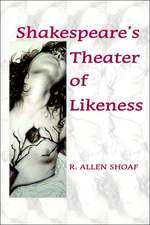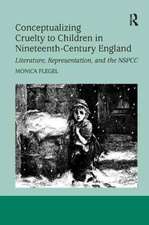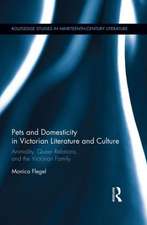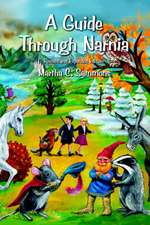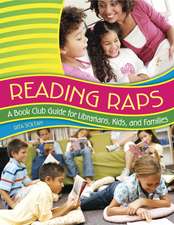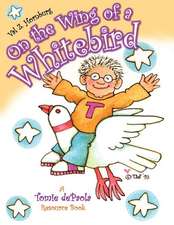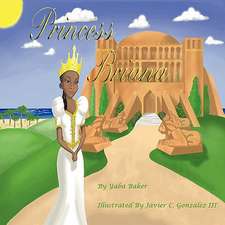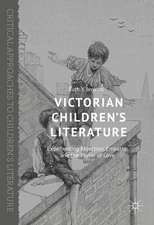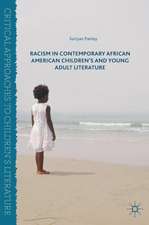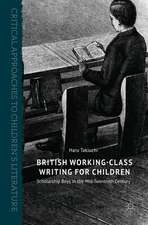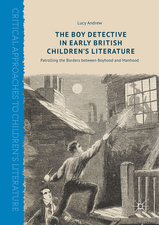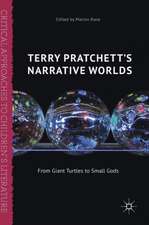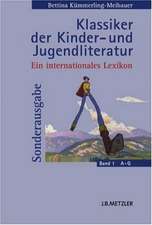Cruel Children in Popular Texts and Cultures: Critical Approaches to Children's Literature
Editat de Monica Flegel, Christopher Parkesen Limba Engleză Hardback – 30 apr 2018
This book explores how alarmist social discourses about 'cruel' young people fail to recognize the complexity of cruelty and the role it plays in child agency. Examining representations of cruel young people in popular texts and popular culture, the collected essays demonstrate how gender, race, and class influence who gets labeled 'cruel' and which actions are viewed as negative, aggressive, and disruptive. It shows how representations of cruel young people negotiate the violence that shadows polite society, and how narratives of cruelty and aggression are used to affirm, or to deny, young people’s agency.
| Toate formatele și edițiile | Preț | Express |
|---|---|---|
| Paperback (1) | 526.50 lei 6-8 săpt. | |
| Springer International Publishing – 25 dec 2018 | 526.50 lei 6-8 săpt. | |
| Hardback (1) | 701.25 lei 6-8 săpt. | |
| Springer International Publishing – 30 apr 2018 | 701.25 lei 6-8 săpt. |
Din seria Critical Approaches to Children's Literature
- 20%
 Preț: 627.43 lei
Preț: 627.43 lei -
 Preț: 381.98 lei
Preț: 381.98 lei - 15%
 Preț: 583.45 lei
Preț: 583.45 lei - 15%
 Preț: 584.10 lei
Preț: 584.10 lei - 18%
 Preț: 730.65 lei
Preț: 730.65 lei -
 Preț: 386.81 lei
Preț: 386.81 lei - 18%
 Preț: 728.74 lei
Preț: 728.74 lei -
 Preț: 391.61 lei
Preț: 391.61 lei -
 Preț: 388.72 lei
Preț: 388.72 lei - 15%
 Preț: 528.13 lei
Preț: 528.13 lei -
 Preț: 387.75 lei
Preț: 387.75 lei - 18%
 Preț: 892.59 lei
Preț: 892.59 lei -
 Preț: 389.70 lei
Preț: 389.70 lei -
 Preț: 386.00 lei
Preț: 386.00 lei -
 Preț: 390.63 lei
Preț: 390.63 lei - 15%
 Preț: 585.40 lei
Preț: 585.40 lei -
 Preț: 381.98 lei
Preț: 381.98 lei - 18%
 Preț: 893.84 lei
Preț: 893.84 lei -
 Preț: 388.72 lei
Preț: 388.72 lei -
 Preț: 392.60 lei
Preț: 392.60 lei - 15%
 Preț: 639.59 lei
Preț: 639.59 lei -
 Preț: 389.70 lei
Preț: 389.70 lei - 15%
 Preț: 642.03 lei
Preț: 642.03 lei - 18%
 Preț: 723.56 lei
Preț: 723.56 lei -
 Preț: 381.59 lei
Preț: 381.59 lei -
 Preț: 388.72 lei
Preț: 388.72 lei -
 Preț: 486.98 lei
Preț: 486.98 lei - 15%
 Preț: 578.05 lei
Preț: 578.05 lei - 15%
 Preț: 584.92 lei
Preț: 584.92 lei
Preț: 701.25 lei
Preț vechi: 825.01 lei
-15% Nou
Puncte Express: 1052
Preț estimativ în valută:
134.18€ • 140.10$ • 111.05£
134.18€ • 140.10$ • 111.05£
Carte tipărită la comandă
Livrare economică 05-19 aprilie
Preluare comenzi: 021 569.72.76
Specificații
ISBN-13: 9783319722740
ISBN-10: 3319722743
Pagini: 326
Ilustrații: XIII, 312 p. 7 illus.
Dimensiuni: 148 x 210 mm
Greutate: 0.54 kg
Ediția:1st ed. 2018
Editura: Springer International Publishing
Colecția Palgrave Macmillan
Seria Critical Approaches to Children's Literature
Locul publicării:Cham, Switzerland
ISBN-10: 3319722743
Pagini: 326
Ilustrații: XIII, 312 p. 7 illus.
Dimensiuni: 148 x 210 mm
Greutate: 0.54 kg
Ediția:1st ed. 2018
Editura: Springer International Publishing
Colecția Palgrave Macmillan
Seria Critical Approaches to Children's Literature
Locul publicării:Cham, Switzerland
Cuprins
1. The Social Function of Child Cruelty; Monica Flegel and Christopher Parkes.- 2. “This Sport of Tormenting”: Cruel Children and their Animals in British Literature, 1750-1800; Heather Ladd.- 3. Innocent Cruelty and the Love of Beauty in Oscar Wilde’s Fairy Tales; Monica Flegel.- 4. Anne is Angry: Female Beauty and the Transformative Power of Cruelty in L. M. Montgomery’s Anne of Green Gables; Christopher Parkes.- 5. Old-School Bullies at Hogwarts: The Pre-Victorian Roots of J.K. Rowling’s Depiction of Child-on-child Violence; Katharine Kittredge and Carolyn Rennie.- 6. Bullies, the Bullied and Bullying Narratives in Contemporary Fiction; Clare Bradford and Lara Hedberg.- 7. Murderous Misfits and Misguided Mentors in Rohan O’Grady’s Let’s Kill Uncle; Rebecca Brown.- 8. Exceptional and Destructive: The Dangerous Child and the Atom Bomb in Postwar Science Fiction; Kristen Gregory.- 9. “Tag . . . You’re It”: Cold War Comics and the Performance of Boyhood and Criminality; Hans Staats.- 10. “Child Psychopath” Films of the 1980s and 1990s; Karen J. Renner.- 11. A “Voodoo Doll in Diapers”: Deconstructing the Cruel Child in Lionel Shriver’s We Need to Talk about Kevin (2003); Sandra Dinter.- 12. “I Want to Die as Myself”: Young Adult Dystopias, Cruelty, and Resistance; Carrie Hintz.- 13. Kindness in a Cruel World: The Formation of Agentic Non-Heteronormative Identity in Contemporary YA Fictions; Victorian Flanagan.- 14. Camping the Killer Child: The Queer Humor of William March’s The Bad Seed on Page, Stage, and Screen; Tison Pugh.
Notă biografică
Monica Flegel is Associate Professor in the Department of English at Lakehead University, Canada. Her research focuses on cultural studies, specifically addressing children, animals, and pop culture and fandom. She is the author of Pets and Domesticity in Victorian Literature and Culture (2015).
Christopher Parkes is Associate Professor in the Department of English at Lakehead University, Canada. His research focuses on children’s literature. He is the author of Children’s Literature and Capitalism: Fictions of Social Mobility in Britain, 1850-1914 (Palgrave, 2012). His current research focuses on YA fiction and the end of social mobility in America.
Textul de pe ultima copertă
This book explores how alarmist social discourses about 'cruel' young people fail to recognize the complexity of cruelty and the role it plays in child agency. Examining representations of cruel young people in popular texts and popular culture, the collected essays demonstrate how gender, race, and class influence who gets labeled 'cruel' and which actions are viewed as negative, aggressive, and disruptive. It shows how representations of cruel young people negotiate the violence that shadows polite society, and how narratives of cruelty and aggression are used to affirm, or to deny, young people’s agency.
Caracteristici
Moves beyond extreme representations of child malevolence, to examine a wider cross-section of texts encompassing sibling rivalry, bullying, and manipulation Presents the cruel child not simply as an adult fear, but also as an important figure in child education and culture Has relevance for Education, Queer Studies, Women’s Studies, Cultural Studies, and Media Studies
